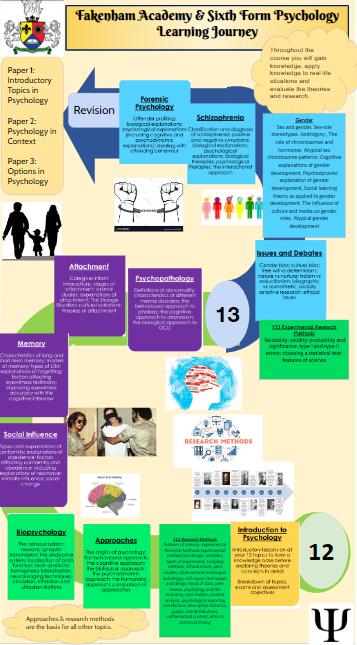- Home
- Curriculum
- Subjects
- Psychology
Psychology

Fakenham Academy Social Sciences Department. Curriculum Summary: Psychology
Last updated: September 2023
Vision:
Social Sciences (Business, Health and Social Care, Psychology and Sociology) are a broad range of real world subjects, which give students knowledge of how to be a kind and well rounded human beings, and improve their community. While studying Psychology, students experience enjoyable lessons which challenge their understanding of how human experience can be explained through different perspectives, how to analyse theories such as explanations of social influence, and how to develop academic literacy in essay writing and numeracy when analysing data collected during research. We encourage students to be ambitious in their learning by tackling difficult topics such as the psychodynamic explanation of criminality, and outside of their learning in their career goals such as studying for a doctorate in clinical psychology. Psychology students are expected to be determined to complete all work to the best of their ability and to meet their academic goals. We want students to leave psychology with a passion for the subject.
https://www.aqa.org.uk/subjects/psychology/as-and-a-level/psychology-7181-7182
Yearly Intent Statements
Year 12: By the end of the year 12 psychology students will have an understanding of the chronology of the origins of psychology and the 7 major approaches explain behaviour and treat mental health conditions. Students will have an understanding of how to conduct psychological research and the difficulties in doing so. Students will have an understanding of social influence, attachment, memory and psychopathology. Within these topics students will be able to apply the approaches and evaluate key studies.
Year 13: By the end of the year psychology students will continue to build on their understanding of psychological approaches and research methods by embedding issues and debates. Students will build on their knowledge of psychopathology by focusing on Schizophrenia as a new mental health condition. Students will understand the possible causes and treatments for Schizophrenia and critically evaluate these. Students will gain knowledge of how people develop gender identity and
Rationale behind sequencing:
Year 12
The sequence has been carefully thought out to ensure that topics are interleaved, build on prior learning and provide foundations for learning in the future. For example, ‘Psychological Approaches’ are taught at the beginning of year 12 and then embedded in later topics such as ‘Attachment’, ‘Psychopathology’ and ‘Forensic Psychology’ to name a few. Please see the mindmap on this link, to see how approaches underpin the majority of psychological knowledge therefore a good understanding of these allows students to engage with other topics in psychology more fully. https://drive.google.com/open?id=1uWFtdgHU8dqN7XcByuNKrv68MUpfTETA
In order to increase understanding of Approaches it is important to note that they should be taught in chronological order. This allows for retrieval practice in drawing timelines at the beginning of lessons, allows students to see how each approach influences each other and reduces the misconception that learning theory and social learning theory are the same approach.
Research methods are imperative in psychology, as the way we collect data informs our psychological knowledge, therefore impacting application of psychological treatment in the real world. Students, across the country, find research methods very difficult. Because students find research methods so difficult, we start teaching them in Autumn 1 of year 12, to introduce students to how science works and the importance of the scientific process. We teach the Year 2 topic ‘Features of Science’ first as students need to understand what scientific study is before they can conduct scientific research. We then teach ‘Ethical research’ to highlight the importance of ethical considerations before conducting any research. Once students have a grasp of research methods, the topic is then embedded into all other areas of the specification with research methods being discussed in nearly all psychology lessons from then on. Additionally, research methods are reviewed and developed in year 2 by adding more complicated concepts and inferential statistics.
Biopsychology is also taught in the Autumn term as it follows on from the biological approach and expands the basic biological knowledge to a more detailed and thorough explanation of how biological structures influence behaviour. The terminology used in biopsychology is used later in the course in other topics. Please see the biopsychology mind map on this link for further explanation. https://drive.google.com/open?id=1j5CUv2zh8OZMcIkoRwejtdUXM92Y8x2a
Skills such as application, essay writing and statistical analysis are introduced gently in year 12 and then built upon throughout the year. Deeper focus on these skills occurs in year 13 where students have extensive practice of these skills.
Year 13
Year 13 starts with issues and debates (I & Ds) as it allows students to recap the psychological approaches and build the I & Ds into the evaluation of the theories they have covered. I & Ds are related to topics from Paper 1 (Memory, Social Influence, Attachment & Psychopathology) which allows these topics to be revised and deepend. Year 2 research methods are also taught alongside I&Ds as it allows for interleaving and making links between approaches, I&Ds and research methods. The final three units, Gender, Schizophrenia and Forensics, are stand alone topics that build on approaches, biopsychology and research methods. These topics are assessed on Paper 3: Options in Psychology. These options are chosen as students enjoy these topics and they link to careers in clinical and forensic psychology which are always popular.



